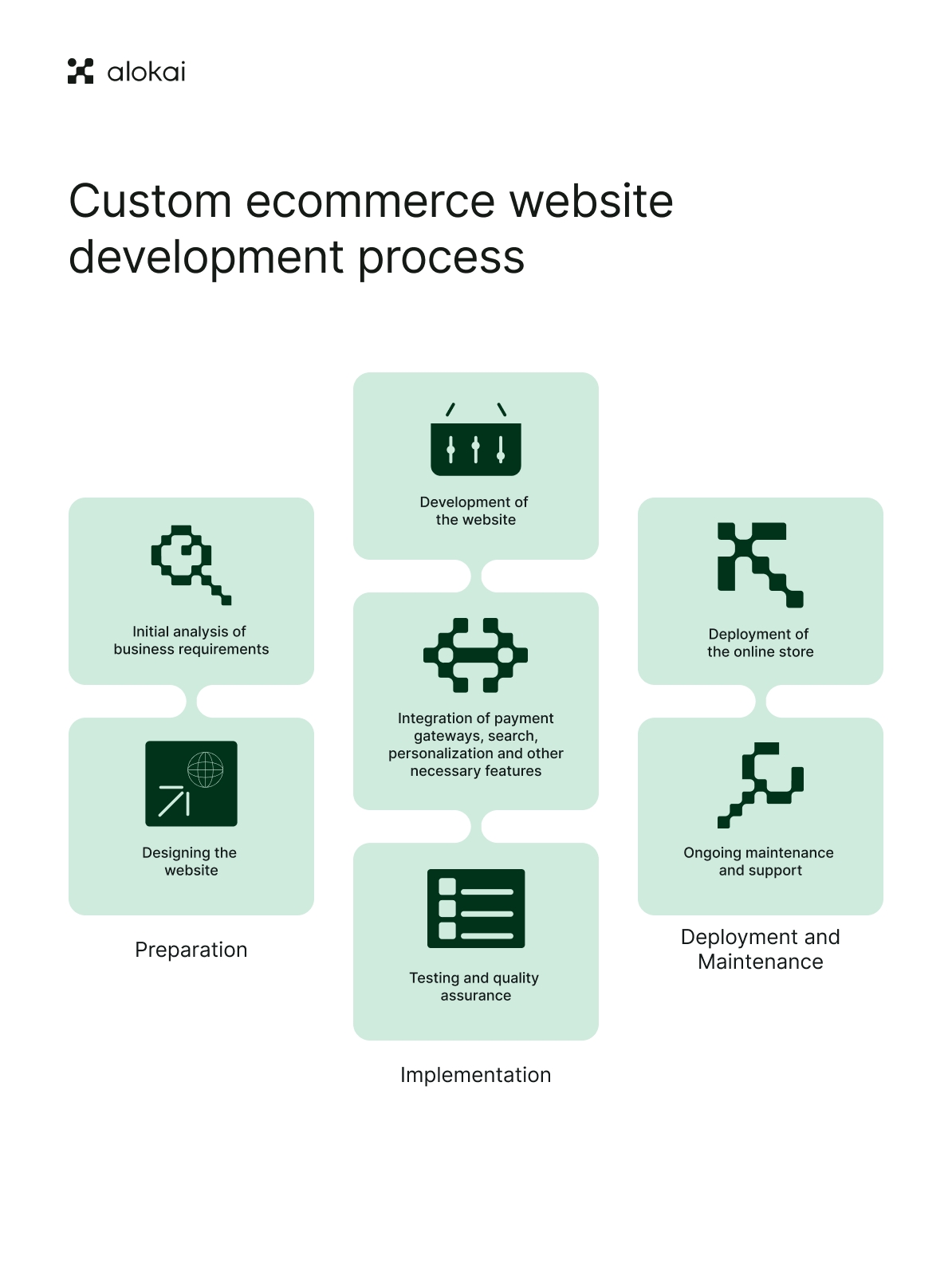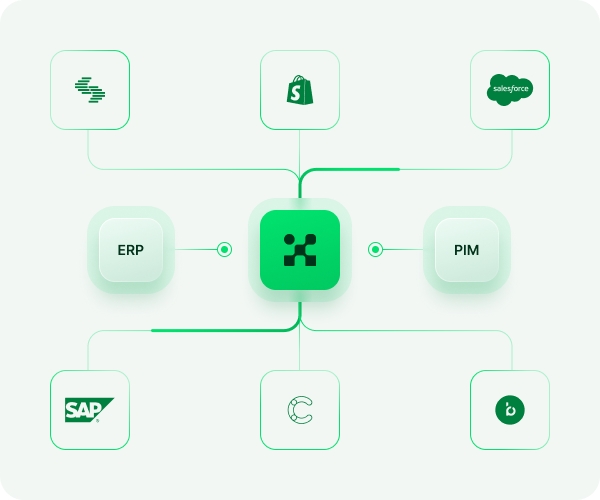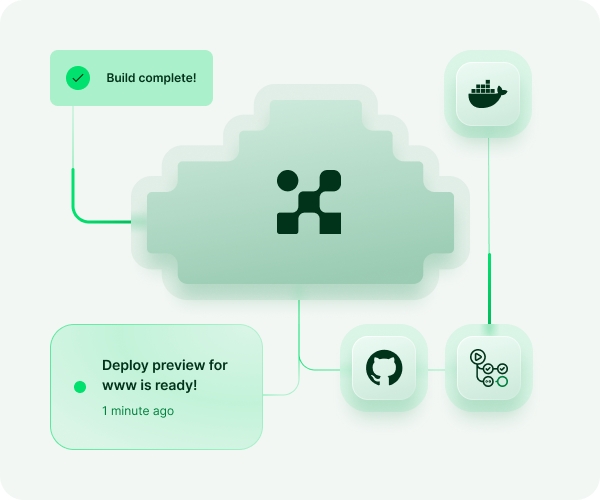Are you weighing the potential of custom ecommerce development to provide a competitive advantage? This targeted guide dissects the strategic value of crafting a bespoke online store, outlines the development process, and underscores the business growth potential of such a tailored approach. Learn how custom ecommerce aligns with your unique brand and market position without the filler.
Key takeaways
- Custom ecommerce development aligns an online store with a brand's unique identity and business objectives, offering tailored experiences that can increase competitive advantage and customer satisfaction.
- Although custom ecommerce solutions offer scalability and innovation, they involve significant investment and development challenges, including a more complex, resource-intensive process than that of ready-made platforms.
- Choosing the right custom ecommerce development partner is crucial, as it requires technical expertise and an understanding of the brand's vision to effectively translate business goals into a successful digital customer experience.
Exploring custom ecommerce development
Diving into online commerce requires a strategy that echoes your brand ethos and meets customer expectations. Custom ecommerce development is not just about building a storefront; it's about crafting a digital experience as unique as your brand. Utilizing custom solutions provides a competitive advantage by aligning every feature of your online store, from the user interface to backend processes, with your business objectives.
Developing a custom ecommerce website involves several stages demonstrating a commitment to quality and precision. Here are the steps involved:
- Initial analysis of business requirements
- Design and development of the website
- Integration of payment gateways and other necessary features
- Testing and quality assurance
- Deployment of the online store
- Ongoing maintenance and support

Each step is an opportunity to refine and enhance the shopping experience, creating a platform that is not only functional but also a true reflection of your brand.
Synchronizing your business objectives with custom ecommerce solutions is a strategic decision that can fuel growth and elevate customer satisfaction. By focusing on tailored functionality and design, businesses can ensure that their online stores provide:
- Seamless, engaging experiences
- User-friendly navigation
- Personalized product recommendations
- Easy checkout process
- Mobile responsiveness
These features are what today's discerning consumers demand.
What is custom ecommerce development?
At its core, custom ecommerce development is about creating an ecommerce website from the ground up with a focus on tailor-made solutions. It's a process that breaks free from the constraints of pre-existing platforms, offering businesses the freedom to design a custom ecommerce site that genuinely embodies their brand and meets the unique demands of their customers.
With custom development, every element of an online store can be optimized to deliver a distinct brand identity and a superior shopping experience.
The development journey
Beginning a custom ecommerce development journey is a complex undertaking that requires a thorough understanding of a business's procedures and objectives. It's a path that involves the following stages:
- Identification of essential business requirements
- Designing and coding
- Rigorous quality assurance
- Strategic deployment
This process involves a fusion of technical skills, ensuring that the final product meets and exceeds expectations.
Aligning business goals with custom solutions
A custom ecommerce solution transcends being just a shopping cart; it's a growth catalyst designed for your business's distinct needs. By aligning your ecommerce platform with your business goals, you create opportunities for improved customer engagement, streamlined business management, and increased sales.
Whether through process automation, custom software development, or end-to-end integration with business systems, a custom ecommerce development company can help you harness the full potential of your online presence by providing custom ecommerce development services, including software development.
Frontend customization: crafting unique customer journeys
The appeal of a custom ecommerce website stems from its capacity to offer a personalized customer journey that embodies your brand spirit and minimizes hurdles in the buying process. Frontend customization is central to this, enabling businesses to curate an aesthetic and functional environment that resonates with their target audience.
It's the art of designing a user interface that looks good and feels intuitive, encouraging engagement and conversion.
Benefits of custom frontend development
The benefits of custom frontend development are manifold. By taking control of your storefront's design, you ensure that every pixel reflects your brand's identity and values. Custom development means your website will display perfectly across all devices, providing an optimal user experience that can increase customer satisfaction and loyalty.
Moreover, with custom frontend development, you can fine-tune site performance and navigation, which are crucial for retaining users and boosting search engine rankings through search engine optimization.
Challenges of custom frontend development
Nevertheless, custom frontend development comes with its own set of challenges. The push for a unique and highly customized storefront can lead to a slower time to market, as the development process is often more complex and time-consuming than pre-built templates. Additionally, the groundwork required for a custom frontend is resource-intensive, involving many tasks that can extend project timelines.
Platform-specific solutions vs. custom ecommerce platforms
When weighing the options between platform-specific solutions and custom ecommerce platforms, the scales tend to tip in favor of the latter for businesses seeking innovation and tailored experiences. Although platform-specific solutions might provide a quick launch, they frequently fall short in flexibility and scalability, essential for long-term business expansion and adapting to evolving market needs.
The limitations of platform-specific solutions
Platform-specific ecommerce solutions come with a predefined set of features and functionalities that can limit a business's ability to innovate and differentiate itself in the marketplace. The rigidity of such platforms can stifle creativity and make it challenging to address the unique needs of different customer segments, leaving businesses at a competitive disadvantage.
The freedom of custom ecommerce platforms
On the other hand, custom ecommerce platforms offer businesses the following benefits:
- The liberty to construct and develop their online stores without the limitations of a one-size-fits-all strategy
- The ability to integrate advanced features, such as live chat and various payment gateways
- The ability to scale operations to meet growing demands
- The opportunity to create a more personalized and practical ecommerce experience
Embracing frontend as a service (FEaaS)

Frontend as a Service (FEaaS) is an emerging solution that blends the customization of a tailored frontend with the ease of cloud-based services. For businesses that find themselves between the desire for a unique online presence and the need for a streamlined development process, FEaaS offers an attractive compromise.
Understanding FEaaS and its advantages
FEaaS simplifies the development process by removing repetitive and time-consuming aspects of frontend creation. By offering pre-built infrastructure and tools, FEaaS enables businesses to focus on perfecting the user experience without being bogged down by the complexities of backend integration.
The result is a faster, more cost-effective path to a professional and engaging ecommerce store and online store.
Alokai: pioneering FEaaS for composable commerce
Alokai stands at the forefront of the FEaaS movement, providing a comprehensive solution that caters to the modern needs of composable commerce. Integrating diverse ecommerce technologies into a cohesive system, Alokai simplifies developing a high-functioning and aesthetically pleasing online store.
5 Reasons to Use Alokai as the Base for Your Ecommerce Accelerator

No-code, low-code, and high-code FEaaS: Making the right choice
In the varied landscape of FEaaS, businesses encounter a range of choices, from no-code to high-code solutions. These options cater to varying technical expertise and customization requirements, allowing companies to select the path that best aligns with their resources and strategic objectives.
Decoding no-code FEaaS
No-code FEaaS platforms are the gateway for business owners and entrepreneurs with little to no technical expertise to step into ecommerce. With intuitive drag-and-drop interfaces, these platforms democratize the creation of online stores, enabling users to launch their ecommerce ventures with minimal effort and investment.
Leveraging low-code FEaaS
Low-code FEaaS strikes a balance between accessibility and customization. It allows businesses with basic programming knowledge to quickly build and deploy ecommerce solutions while offering the flexibility to add custom scripts and integrations for a more tailored experience.
Unleashing potential with high-code FEaaS
For businesses with complex requirements or those seeking to push the boundaries of ecommerce innovation, high-code FEaaS provides the ultimate level of customization. It enables the creation of highly specialized features and functionalities, ensuring that even the most intricate business logic can be seamlessly integrated into the online store.
Custom ecommerce website development: Key features to consider
When undertaking custom ecommerce website development, businesses should consider several key features to guarantee the success and scalability of their online store. From streamlined checkout funnels to advanced analytics, these features are the building blocks of a robust and effective ecommerce platform.
Tailored product catalogs and payment gateways
An optimized product catalog is essential for maintaining customer interest and satisfaction. By providing up-to-date product information and real-time inventory updates, businesses can minimize the risk of customer disappointment.
Additionally, integrating a variety of payment gateways ensures that customers have a smooth and secure checkout experience, catering to a global audience.
Enhanced security measures to protect customer data
In the digital world, customer trust is paramount, and robust security protocols are non-negotiable. Custom ecommerce platforms must prioritize features such as secure payment gateways and SSL certificates to safeguard customer data and comply with industry regulations.
Advanced analytics for data-driven decisions
Data is the lifeblood of strategic ecommerce decision-making. By integrating advanced analytics tools, businesses can glean actionable insights from customer behavior, enabling them to refine their marketing strategies and enhance the overall shopping experience.
The cost-benefit analysis of custom ecommerce solutions
Although custom ecommerce solutions necessitate a considerable initial investment, they promise significant long-term returns. By considering both the immediate costs and the future benefits, businesses can make informed decisions about whether a custom approach to ecommerce is the right choice for their growth and success.
Estimating development costs
The development costs associated with custom ecommerce can vary widely, influenced by factors such as the complexity of the desired features, the choice of technology stack, and the development partner’s expertise. Considering low-code FEaaS option can often reduce the need for a large development team and accelerate the time-to-market, potentially lowering overall costs.
Evaluating long-term ROI
The actual value of a custom ecommerce solution often materializes over time as businesses begin to see improvements in customer retention, increased sales, and enhanced brand loyalty. Investing in a solution custom-tailored to your business needs can lead to a higher return on investment, justifying the initial expenditure.
Finding your custom ecommerce development partner
Choosing the appropriate custom ecommerce development partner is pivotal to achieving your online business goals. It’s essential to choose a company that not only possesses the technical expertise but also understands your vision and is committed to bringing it to fruition.
Criteria for choosing a custom ecommerce development company
The criteria for choosing a development partner extend beyond technical prowess. It’s about finding a team that demonstrates:
- a track record of success
- an understanding of the nuances of ecommerce
- the ability to translate your business model into an engaging digital experience for your customers.
The role of a dedicated team in achieving your vision
A committed team from a credible custom ecommerce development company could be instrumental in unleashing the full potential of your online store. Such a team will focus on:
- Translating your specific needs into a custom-built ecommerce website
- Ensuring that each aspect of the digital experience aligns with your business strategy
- Targeting your audience effectively
Summary
In conclusion, custom ecommerce development represents a strategic investment that empowers businesses to tailor their online presence to their unique brand identity and customer needs. Through a meticulous development process, companies can create an ecommerce platform that stands out from the competition and provides a solid foundation for growth and customer engagement. Whether you embrace the flexibility of FEaaS or commit to a fully bespoke solution, the path to ecommerce success hinges on a deep understanding of your business goals and creating a customer journey that resonates with your target audience.
